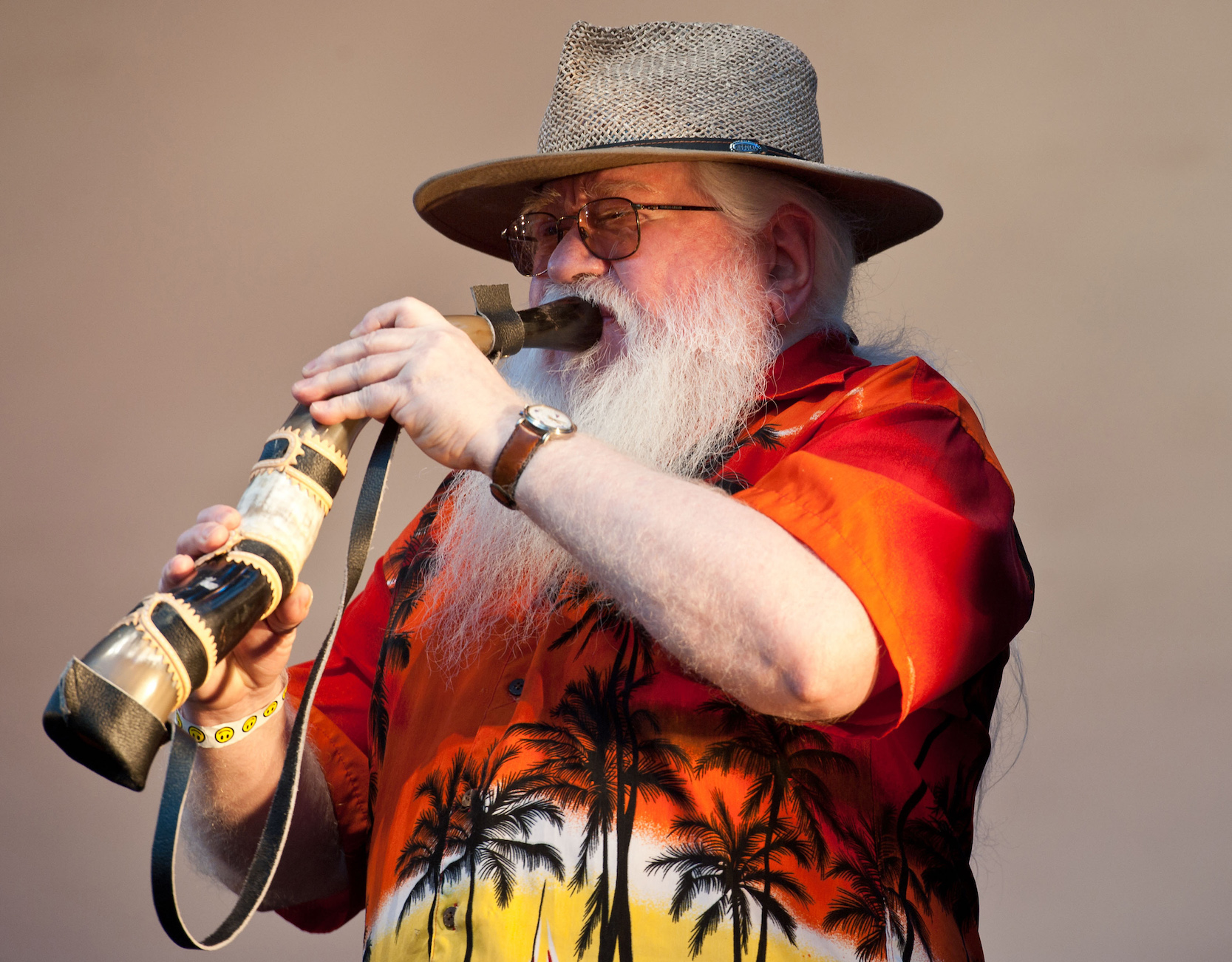 |
Hermeto Pascoal

Hermeto Pascoal & Grupo
Hermeto Pascoal - keyboard, accordion, teapot, bass flute, his skeleton, cup of water etc.
Itiberê Zwarg - electric bass and percussion
André Marques - piano, flute and percussion
Jota P. - saxes and flutes
Fábio Pascoal - percussion and stage direction
Ajurinã Zwarg - drums and percussion
Hermeto Pascoal was born June 22, 1936 in Olho d'Agua das Flores in Alagoas,
the Brazilian Northeast. He was a child musical prodigy: he started with the flute and
at the age of eight he was already playing sanfona, a button accordeon.
By eleven he was performing at dances and forrós in the region around Arapiraca.
When he was fourteen, his family moved to Recife, and Hermeto began to earn money on
radio programs there, playing with a group with his brother, Jose Neto. By the end of
the 1950s he moved once again, to the south of the country.
His voracious musical appetite was already careening, as Hermeto began learning to
play almost any instrument he came across: piano, bass, reeds, everything.
Like every musician of the era, he formed bossa nova groups in the early '60s,
playing with artists who today have well respected careers, among them Airto Moreira,
Heraldo do Monte and Sivuca with whom he had an accordeon trio called
"O Mundo em Chamas" ("World on Fire").
In 1964, he formed the Sambrasa Trio with Airto Moreira and bassist Humberto Clayber.
"When I met him, he was subbing for other accordionists, and we started getting him work"
reported Moreira. We would often stay up all night talking about music". Later,
Airto was in a band called Trio Novo with guitarists Heraldo do Monte and
Theo de Barros; Hermeto joined them and the group changed its name to Quarteto Novo.
The quartet dedicated itself to progressive re-invention of northeastern song styles.
"We played baião, xaxado, other northeastern Brazilian rhythms, but the arrangements
were very jazzy, in 4/4 time with modern harmonies".
Unfortunately, the band cut just one album - 1967's Quarteto Novo. This group exerted
such a decisive influence upon Brazilian instrumental music in the sixties that its
effect can still be felt today.
In 1970 Airto invited Hermeto to the United States to record an album. Antonio Carlos
Jobim, Duke Pearson and Flora Purim also sent him plane tickets. Hermeto's lack of
English caused him problems. But as he says, the only thing you have to know how to
say in the United States is, "Where is my money?" He also recorded with the great
Miles Davis, and contributed two songs to the trumpeters acclaimed 1970 album
"Live Evil": Igrejinha (Little Church) and "Nem Um Talvez" (Not even a maybe).
While in North America, the multi-instrumentalist drew raves both for his extraordinary
improvisational abilities in concert and for his idiosyncratic and original
compositions. His material was recorded by such diverse artists as Gil Evans and the
Berlin Symphony.
Hermeto's songs explored choro, frevo, maxixe, baião, jazz and many other forms,
mixing them freely and in unusual combinations. Individual songs often had multiple
rhythms.
He returned to Brazil in 1973, recorded A Musica Livre De Hermeto Paschoal,
before heading back north to the United States in 1976 to record Slave's Mass.
That album featured one of Hermeto's most unusual instruments - piglets, whose little
grunts he incorporated into the music - along with the human talents of Airto, Flora
Purim, Laudir de Oliveira, Raul de Souza, David Amaro, Ron Carter, and Alphonso
Johnson. Lyle Mays has said: "Hermeto is worth listening to just for his wild
creativity. His music tends to show me the possibilities that I should try to open
myself up to explore. He has real devotion to the making of music and it comes
across - let's go for it, let's do everything we can!" His records are indeed
free-wheeling and uninhibited, and they usually feature the backing of Pernambuco
(percussion), Jovino Santos Neto (keyboards and flutes), Marcio Bahia (drums),
Carlos Malta (flutes, saxophones), and Itibere Zwarg (bass), all very talented
musicians.
From 1983 to 1989 he recorded for a small, audiophile label called Som Da Gente,
specialized in instrumental music. In 1990's he only released 2 studio albums:
"Festa dos Deuses" in 1992 and "Eu e Eles" in 1999. In the latter he played all
instruments himself, and there is dozens of them.
Source: The Billboard Book Of Brazilian Music by Chris McGowan & Ricardo Pessanha.
• links •
Biography on Wikipedia
Biography on All Music
• video •
Hermeto Pascoal & Grupo - "Tamancos e Piloes" - Live @ Jazz à Porquerolles 2018
|
 |
